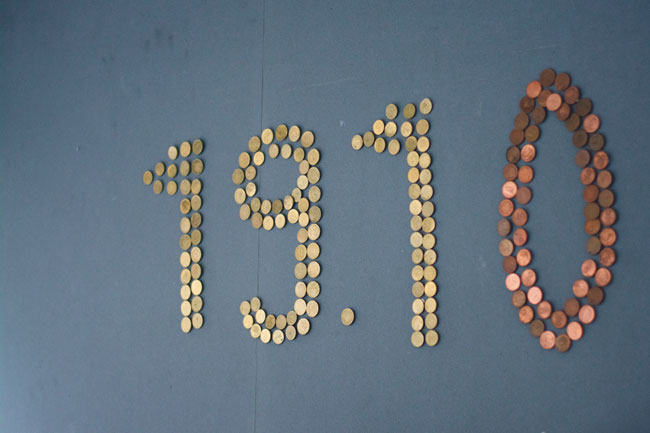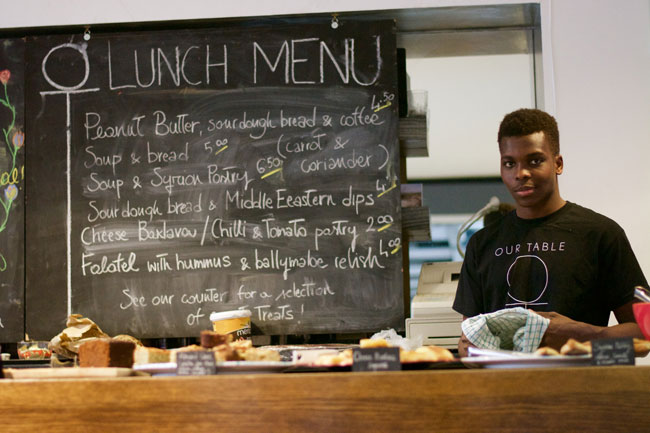There are few days as satisfying as those that follow Christmas, when, bundled in fleecy pyjamas or blankets and smelling of central heating, you can emerge from your film-viewing nest and pick at leftover ham, turkey, roast potatoes and stuffing. My own Christmas wouldn’t be complete without my usual sandwich of turkey, ham, brie cheese and cranberry sauce. One year, I even experimented with my own version of the “moist-maker” from Friends, a disaster in many sense, but something that kept my family and I busy throughout the Christmas break. At a time like Christmas, when your table somehow balances more food than at any other point in the year, it can be easy to forget what a privilege food is.
Our Table, a pop-up cafe that was located in the Project Arts Centre until December 16th, is a project with the privilege of food firmly at its core. Set up by Michelle Dermody, of Slice and the Cake Cafe; and Ellie Kisyombe, an activist with the Irish Refugee Council; to campaign against the direct provision system in Ireland, under which residents are prohibited to cook their own food, the cafe highlights the cultural void this creates in a person’s life and subtly reminds those of us outside of the direct provision system to be appreciative of the comfort we can find in food. Worse still, residents in the system are treated to the same foods at the same times no matter what their nationality, medical requirements or personal taste, making for an alienating and comfortless relationship with food.
We have been running campaigns to end direct provision because of the frustration that it brings to us, and we said ‘Let’s run this campaign with food’
Originally introduced as an “emergency measure” to cater for asylum seekers in 1999, Ireland’s direct provision system has been a target for criticism for a number of years already, and Our Table is the latest (and most creative) campaign against it. There are currently over 4,000 people, including 1,600 children, living in centres across the country. Under the system, residents are also not allowed to benefit from social benefits, employment or free third-level education. The result is often a claustrophobic and unfulfilling existence, with many residents suffering from depression, according to the Irish Refugee Council.
“As you know, food is cultural and it talks to you”, said cafe manager, Lucky Khambule, sitting down with me in the cafe on a crisp Friday afternoon. “We have been running campaigns to end direct provision because of the frustration that it brings to us, and we said ‘Let’s run this campaign with food’, because we believe food is another platform to bring people together and let people chat in a round table.”
In the lead up to Christmas, the significance of food becomes even more prominent. “In direct provision”, Khambule explained, “when everybody is going haywire, shopping this, shopping that, getting groceries and preparing what they are going to prepare for the meal for the Christmas day, we don’t have that liberty, because we have to eat what we are given for Christmas as well. We have to queue for the meal for Christmas.”

The restrictions are in no way lifted for the festive season, as he noted: “I don’t even see why they can’t give just one day to residents, to say ‘You go and prepare your meals for your Christmas the way that you know how.’ So we don’t feel Christmas.” The extent of the government’s festive generosity is a €16.23 bonus for adults in direct provision, working out at €13.26 for a child, on top of their €19.10 and €15.60 respectively, which in contrast to the hundreds of euros families could spend on the holiday seems like a Dickensian pittance.
Khambule, who comes from South Africa, was in direct provision for almost four years and only received his residency two months ago, in the midst of setting up the cafe: “You know, sometimes things just mysteriously happen.” He recalled that Kisyombe was more excited about the news than he was as “she could see the benefits of the projects immediately for a person who is coming from direct provision”. Khambule said that, over the last three Christmases, he has cultivated his own ways of “not being confined by this system”, and usually celebrates away from the centres with friends.
While one could expect this year to be far more celebratory for him, given his recent residency, Khambule asserts that that isn’t necessarily the case. “I was talking to some people as well, and I said ‘This year, yeah, I’m supposed to be celebrating something personally, but my heart still goes to the people stuck in these centres. I can’t be celebrating when I know there are people who are suffering there. To me, it will be a closed kind of dinner, lunch, with friends and that’s it.”
When asked how Christmas would play out back home in South Africa, Khambule was visibly warmed by memories of a very different festive season. “I must just say, here people don’t celebrate Christmas. It’s the lousiest time of the year here. It’s cold, you only see people going to shops. Christmas day here is the worst day! You don’t see people. With us, we celebrate, we’re out there. Even New Year’s Eve, I don’t see anyone, it’s dead. People sleep. How do you sleep on Christmas Eve? On New Year’s Eve?” He conceded that “maybe the weather is chasing people away, but with us, it’s full blow”.
In South Africa, he said, everything hinges on the family returning from work or any number of far-flung places to prepare, clean and cook together. South African tradition is to slaughter either a sheep or chickens and prepare a veritable feast that sees friends and family alike passing through the home, plates in hand: “So I would go to your house and I don’t even have to say why I’m there, you just give me something to eat. You don’t stay in your home, you move around.”
I can’t be celebrating when I know there are people who are suffering there. To me, it will be a closed kind of dinner, lunch, with friends and that’s it
That same sense of community is what drives Our Table, and in its training of volunteers from direct provision – on a staff that spans nations, from Angola to Guinea – the cafe seeks to fill a cultural and personal void left by the system. “I want to paint this picture to you, as females, as daughters”, Khambule told us, leaning forward gently.
“I will take you back when you were five, six years old. Imagine what your mother used to do at that time, at home. If your mother is making a meal, chopping potatoes, chopping carrots, chopping tomatoes, and the little girl is pulling. She wants to do something, to take that knife. She doesn’t know what the danger of it is, but she wants to do it because she’s seeing the mother doing it. What we are saying is, that moment at that time is taken away from a person who is in direct provision, because they’ve never seen a mother go into a kitchen and making just a sandwich.”







